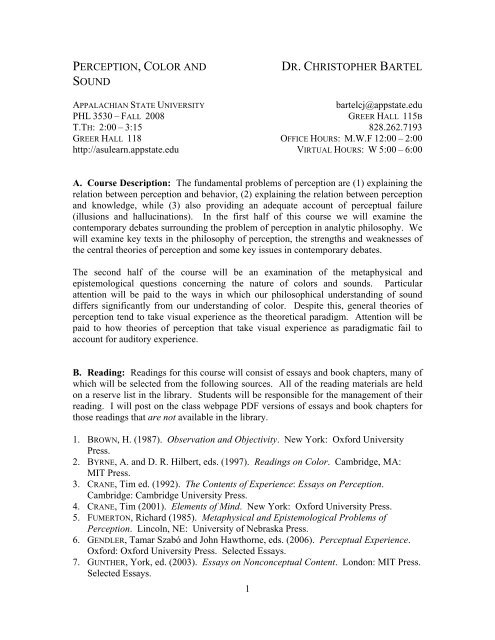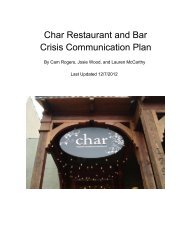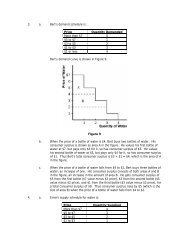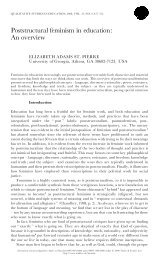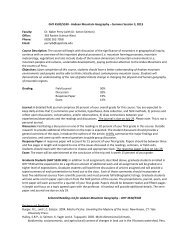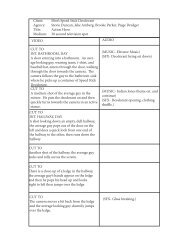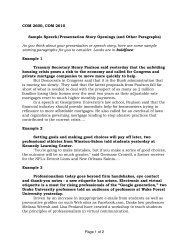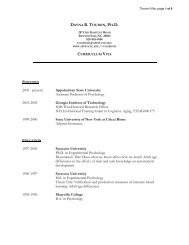PERCEPTION, COLOR AND SOUND DR. CHRISTOPHER BARTEL
PERCEPTION, COLOR AND SOUND DR. CHRISTOPHER BARTEL
PERCEPTION, COLOR AND SOUND DR. CHRISTOPHER BARTEL
You also want an ePaper? Increase the reach of your titles
YUMPU automatically turns print PDFs into web optimized ePapers that Google loves.
<strong>PERCEPTION</strong>, <strong>COLOR</strong> <strong>AND</strong><br />
<strong>SOUND</strong><br />
APPALACHIAN STATE UNIVERSITY<br />
PHL 3530 – FALL 2008<br />
T.TH: 2:00 – 3:15<br />
GREER HALL 118<br />
http://asulearn.appstate.edu<br />
<strong>DR</strong>. <strong>CHRISTOPHER</strong> <strong>BARTEL</strong><br />
bartelcj@appstate.edu<br />
GREER HALL 115B<br />
828.262.7193<br />
OFFICE HOURS: M.W.F 12:00 – 2:00<br />
VIRTUAL HOURS: W 5:00 – 6:00<br />
A. Course Description: The fundamental problems of perception are (1) explaining the<br />
relation between perception and behavior, (2) explaining the relation between perception<br />
and knowledge, while (3) also providing an adequate account of perceptual failure<br />
(illusions and hallucinations). In the first half of this course we will examine the<br />
contemporary debates surrounding the problem of perception in analytic philosophy. We<br />
will examine key texts in the philosophy of perception, the strengths and weaknesses of<br />
the central theories of perception and some key issues in contemporary debates.<br />
The second half of the course will be an examination of the metaphysical and<br />
epistemological questions concerning the nature of colors and sounds. Particular<br />
attention will be paid to the ways in which our philosophical understanding of sound<br />
differs significantly from our understanding of color. Despite this, general theories of<br />
perception tend to take visual experience as the theoretical paradigm. Attention will be<br />
paid to how theories of perception that take visual experience as paradigmatic fail to<br />
account for auditory experience.<br />
B. Reading: Readings for this course will consist of essays and book chapters, many of<br />
which will be selected from the following sources. All of the reading materials are held<br />
on a reserve list in the library. Students will be responsible for the management of their<br />
reading. I will post on the class webpage PDF versions of essays and book chapters for<br />
those readings that are not available in the library.<br />
1. BROWN, H. (1987). Observation and Objectivity. New York: Oxford University<br />
Press.<br />
2. BYRNE, A. and D. R. Hilbert, eds. (1997). Readings on Color. Cambridge, MA:<br />
MIT Press.<br />
3. CRANE, Tim ed. (1992). The Contents of Experience: Essays on Perception.<br />
Cambridge: Cambridge University Press.<br />
4. CRANE, Tim (2001). Elements of Mind. New York: Oxford University Press.<br />
5. FUMERTON, Richard (1985). Metaphysical and Epistemological Problems of<br />
Perception. Lincoln, NE: University of Nebraska Press.<br />
6. GENDLER, Tamar Szabó and John Hawthorne, eds. (2006). Perceptual Experience.<br />
Oxford: Oxford University Press. Selected Essays.<br />
7. GUNTHER, York, ed. (2003). Essays on Nonconceptual Content. London: MIT Press.<br />
Selected Essays.<br />
1
<strong>PERCEPTION</strong>, <strong>COLOR</strong> <strong>AND</strong> <strong>SOUND</strong><br />
<strong>DR</strong>. <strong>BARTEL</strong><br />
8. HACKER, P. (1987). Appearance and Reality. New York: Basil Blackwell.<br />
9. HARDIN, C. L. (1988). Color for Philosophers. Indianapolis: Hackett.<br />
10. O’CALLAGHAN, Casey (2007). Sounds. New York: Oxford University Press.<br />
11. ROBINSON, Howard (1994). Perception. London: Routledge.<br />
12. SMITH, A. D. (2002). The Problem of Perception. London: Harvard University<br />
Press.<br />
C. Assessment: There are three components that you will be graded on: six online<br />
quizzes, one class presentation and one final writing assignment. Your grade for the<br />
course will simply be the average of the scores you received on each of these<br />
assignments. The average grade for your quizzes will be worth 30% of your grade; your<br />
class presentation will be worth 30% of your grade; and the final writing assignment will<br />
be worth 40% of your grade.<br />
There will be six quizzes, of which only the best five will be counted towards your grade.<br />
These quizzes will be multiple choice, and students will have thirty minutes to complete<br />
each quiz. These quizzes are designed to test your understanding of the lecture material.<br />
Students can access the quizzes online through the AsULearn website (http://appstate.<br />
remote-learner.net). Quizzes will be scheduled outside of class time over a period of five<br />
days (after class on Thursday to the beginning of class on Tuesday). Students should<br />
regularly refer to this website to familiarize themselves with the quiz schedule.<br />
Your class presentation will be scheduled during the last three weeks of the course.<br />
Students may present a topic of their choosing based on the material covered in the<br />
course lectures, or students may choose to have a question assigned to them by the course<br />
instructor in advance of their presentation. Each speaker will be required to speak for 10<br />
minutes from an essay written in advance of the presentation. A very brief question and<br />
answer period may follow each presentation if needed. A copy of the essay must be<br />
provided to the instructor. You will be graded on both content and effectiveness.<br />
For the final assignment, you may choose between either of two options. You may either<br />
write a term paper consisting of your own original research or you may take a final takehome<br />
exam.<br />
Option 1: The term paper would be a 3000 word paper (+/- 10%) in which you<br />
develop your ideas on one of the topics that we will have discussed in class. If you<br />
choose to write a term paper, you will be entitled to meet with me three times out of<br />
class: (1) to discuss the topic of your paper and the essays you will use for research,<br />
(2) to discuss the research you have done and discuss the organization of your essay,<br />
and (3) to discuss a rough draft of your essay. The final essay is due at 6:00pm on<br />
Friday, December 12. Late essays will lose 10 points for each 24 hour period.<br />
Option 2: The final exam will consist of ten questions related to the material that we<br />
will have discussed during the course. You will be asked to choose three of those<br />
questions and write a brief essay for each. The exam will be take-home—it will be<br />
2
<strong>PERCEPTION</strong>, <strong>COLOR</strong> <strong>AND</strong> <strong>SOUND</strong><br />
<strong>DR</strong>. <strong>BARTEL</strong><br />
handed out at the beginning of the fifteenth week of classes and will be due at 6:00pm<br />
on Friday, December 12. Late exams will lose 10 points for each 24 hour period.<br />
D. Policies: Participation and Attendance. Neither class participation nor class attendance will<br />
affect the determination of your grade. However, if you regularly skip classes, then I would not<br />
expect you to do very well on the assignments; and if you do not participate in discussions, then I<br />
expect you will be very bored.<br />
Cheating, Collusion and Plagiarism. Do not cheat, collude or plagiarize. The University does not<br />
tolerate this and I find it personally insulting. If I suspect you of cheating, collusion or<br />
plagiarism, I will request that you complete a new assignment. If I discover that you have been<br />
cheating, colluding or plagiarizing, you will automatically earn an F for the course, and you will<br />
be reported to the University for disciplinary action. You are to avoid the mere suspicion of<br />
violating academic integrity. All students are advised to familiarize themselves with the<br />
Academic Integrity Code, which can be found at the Office of Student Conduct’s website<br />
(http://studentconduct.appstate.edu/).<br />
Late Quizzes. The schedule of quizzes is set in advance, which students can review on the<br />
AsULearn website. Because only the top five quizzes and essays will be counted towards each<br />
students’ grades, I will not allow late quizzes—no exceptions. Any student’s grade will not<br />
(necessarily) be detrimentally effected until the student has missed two or more quizzes.<br />
Late Final Assignments. Both the final essay and the final exam are due at 6:00pm on<br />
Friday, December 12. Late essays or exams will lose 10 points for each 24 hour period.<br />
Class presentations. Any student who fails to give a presentation will receive a failing<br />
grade for that assignment. Presentations can be postponed in advance if necessary to<br />
account for any scheduling conflicts, but “make-ups” will not be allowed.<br />
Special Needs. Appalachian State University is committed to making reasonable<br />
accommodations for individuals with documented qualifying disabilities in accordance with the<br />
Americans with Disabilities Act of 1990, and Section 504 of the Rehabilitation Act of 1973.<br />
Those seeking accommodations based on a substantially limiting disability must contact and<br />
register with The Office of Disability Services (ODS) at www.ods.appstate.edu or 828-262-3056.<br />
Once registration is complete, individuals will meet with ODS staff to discuss eligibility and<br />
appropriate accommodations.<br />
3
<strong>PERCEPTION</strong>, <strong>COLOR</strong> <strong>AND</strong> <strong>SOUND</strong><br />
<strong>DR</strong>. <strong>BARTEL</strong><br />
E. Lecture Schedule:<br />
Tuesday<br />
Thursday<br />
1 Everything you need to know about<br />
Philosophy<br />
Everything you need to know about<br />
Philosophy of Mind<br />
2 Direct Realism and the Problem of<br />
Perception: Illusions and Hallucinations<br />
Indirect Realism, Sense-Data and the Veil<br />
of Perception<br />
3 Intentionalism: There is no Perceptual<br />
Relation<br />
Disjunctivism: The Multiplicity of Mental<br />
States<br />
4 Representational Content and Phenomenal Strong and Weak Intentionalism<br />
Character<br />
5 Nonconceptual Content: The Arguments<br />
For and Against<br />
Making Sense of the Distinction:<br />
Russellian Contents and Mind-Dependence<br />
6 What Properties are Represented in<br />
Experience?<br />
The Senses: The Classical Aristotlian<br />
Model<br />
7 Introduction to Color Theory: Micro-<br />
Physics and Supervenience<br />
An Overview of the Philosophical Theories<br />
of Color<br />
8 Color Physicalism: Colors as Reflectance NO CLASS<br />
Properties<br />
9 Dispositionalism: A Response Dependence Eliminativism<br />
Accounts of Color Perception<br />
10 The Structure of Color Relations and the<br />
Resemblance of Colors<br />
Experience and Conceptualization: Color<br />
Concepts and Color Language<br />
11 Introduction to the Philosophy of Sound Physicalism, Dispositionalism and<br />
Eliminativism for Sounds<br />
12 Sounds: Events or Properties of a Medium? The Ontology of Sounds: Echoes and<br />
Vacuums<br />
13 Phenomenology and the Production of<br />
Sounds<br />
Locating Sounds: Public Space and<br />
Egocentric Space<br />
14 Student Presentations 1 NO CLASS<br />
15 Student Presentations 2 Student Presentations 3<br />
16 Student Presentations 4 NO CLASS<br />
4


